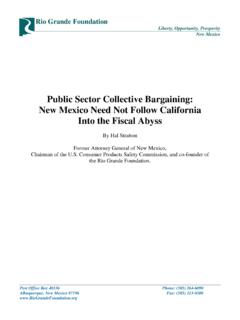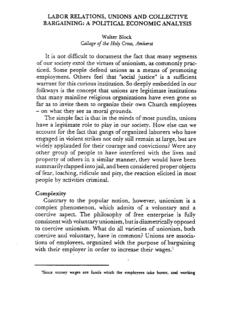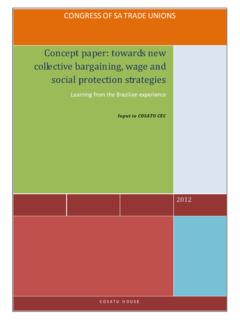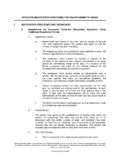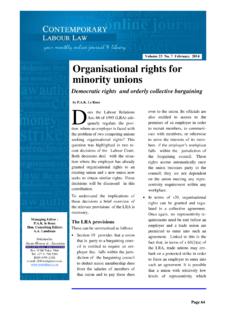Transcription of HANDLING GRIEVANCES: TYPES OF GRIEVANCES
1 HANDLING GRIEVANCES : TYPES OF GRIEVANCES 1. WHERE DO GRIEVANCES COME FROM? For a real grievance to have occurred there must have been a violation of an employee's rights on the job. Also, it must have been the employer or one of his/her agents -- like a supervisor or manager -- who has violated these rights, directly or indirectly. If an em-ployee makes a compliant that doesn't involve the employer in some way, you may still have to deal with it, but it won't be a grievance . Most GRIEVANCES are "real" in the sense that we are sure the employer has violated some-one's rights; but this doesn't mean we will always win the case.
2 We are limited by the con-tract, by our skills, or by how much union power we have. So a grievance can turn out to be no more than an "alleged violation" or even just a complaint. It's your job as a steward to decide which rights have been violated and so determine whether a grievance exists. Because most employees' rights are contained in the contract, this is the first place you look to see if there is a real grievance against the management. If the grievance is a clear-cut violation of the contract, it will be easy to prove provided you stick to your guns. If it involves an interpretation of the contract, it will not be so easy to prove. The kinds of GRIEVANCES that may occur under the contract are: a.
3 Wage grievance - failure to pay agreed rating including: starting pay automatic increase merit increase improper classification of job employee wrongly classified shift premium vacation pay or bonus call-in pay improver incentive or piece rate b. Wage Inequities (usually handled through collective bargaining negotiations or through supplementary wage agreements) c.
4 Unreasonable Rate of Production or Workload (Speedup) violation of time or production standard can be approached from the standpoint of a physical working condition or violation of principle of "fair day's work for fair day's pay." d. Assignment and Placement of Workers improper transfer (violation of seniority clause) improper promotion improper allocation of work (as in overtime) improper layoff or recall e. Disciplinary Action because of: unreasonable rule penalties without just cause employees not properly notified of rule or penalties reprimand (recording warning) disciplinary layoffs discharge f.
5 Physical Working Conditions unsafe or unhealthy working conditions (could be a violation of provincial, state or federal safety laws or workplace rules). g. Supervisory Practices abuse of authority intimidation or coercion over-supervision (snooping) inadequate supervision (failure to instruct properly) supervisor working on bargaining unit jobs discrimination favoritism h. Personal Rights and Privileges leaves of absence failure to accord equal treatment (discrimination) i.
6 Violation of Union Rights failure to give proper representation (no steward working overtime) undermining the union undermining grievance procedure j. Other Contract Violations some contracts may contain clauses not covered by the above lists But, unless your contract limits GRIEVANCES to items covered in the collective bargaining agreement, some GRIEVANCES are outside the contract. These are: Violation of federal or provincial or state law Here you might have the option of filing a grievance or going to the appropriate government agency to get redress.
7 If advice from your chief steward or local union business representative is inconclusive, go ahead with both. Past practice in the workplace This can be the basis for a grievance , particularly in areas where the contract is si-lent or unclear, where a past practice has been violated by the management, an em-ployee may have a real grievance . But, to be considered a past practice, the circum-stances must have been repeated over an extended period of time; accepted explic-itly or implicitly by both workers and management, , by verbal agreement or in writing, without either side formally objecting; or while violating the contract, nei-ther side has demanded that this part of the contact be enforced.
8 Failure of management to live up to their responsibilities, particularly over health and safety conditions Employer's rules These can be made and changed as long as they are consistent with the contract. But, while they are in existence, they cannot be violated by either side and so they can be the basis for a grievance . 2. WHO IS AGGRIEVED? Summary: we can classify GRIEVANCES according to where they come from and how they arise, but we can also look at them according to who is affected. Individual GRIEVANCES Most grievance affect only a single individual. Even so, you as a steward should be filing the grievance , not the employee on her/his own (if the contract permits it).
9 It is in the interests of everyone in the union that the grievance is handled properly, bearing in mind the interests of the union as well as the griever. And, when an indi-vidual's rights have been violated and he or she refuses to file a grievance , you should file the grievance on behalf of the union -- especially if the contract specifi-cally permits it. In this way, you will defend the collective bargaining agreement and protect the rights of all employees covered by it. The management's argument that you cannot file an individual grievance on behalf of the union is invariably false. Group GRIEVANCES This is where several employees have the same complaint.
10 Usually you file the grievance on behalf of the group (who must be clearly named or defined) though there is nothing wrong with filing a series of individual GRIEVANCES dealing with the same issue. Union grievance or policy grievance Exactly what your rights are and exactly what these GRIEVANCES are called depends on the language used in the contract. These two TYPES of GRIEVANCES usually mean the same thing. The union grievance is one that is filed by the union on behalf of a group of indi-viduals or the whole bargaining unit -- or on behalf of an individual who refuses to file it. Invariably, a union grievance is one in which the union considers its rights to have been violated, and not just the rights of individuals in the bargaining unit.

